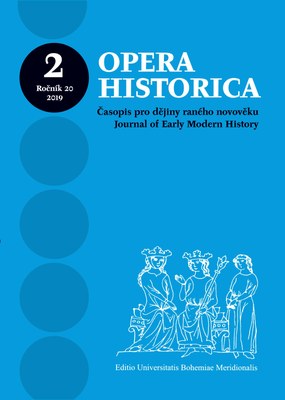Political Communication between Prague, Heidelberg and London at the Time of the Bohemian Revolt
Political Communication between Prague, Heidelberg and London at the Time of the Bohemian Revolt
Correspondence and communication networks
Author(s): Pavel KrálSubject(s): History, Diplomatic history
Published by: Jihočeská univerzita v Českých Budějovicích
Keywords: Bohemian Revolt; England; James I; Frederick V of the Palatinate; Political communication; Diplomacy; Correspondence network
Summary/Abstract: The study focuses on ways and tools of political communication between the Bohemianestates and the Stuart England. Besides searching for main communication channelsamong the Czech lands, the Palatinate and England, the main goal of the study isto identify who the principal actors of this communication were and what centres theyused. Objects of interest include a reconstruction of communication and correspondencenetworks established by these key stakeholders and the ways they used to achieve theiraims. Basic sources are the correspondence of diplomatic, political and military representativesof the English court, the Elector Palatine and the Kingdom of Bohemia. Thecommunication of the Bohemian estates with the English royal court was never directduring the Bohemian Revolt. The Estates resorted to mediating roles of the Palatinateand Dutch General Estates. Their attempts at correspondence with the English Kingremained largely unanswered. The Bohemian matters were also a part of correspondencebetween James I and Frederick V of the Palatine and his wife Elizabeth Stuart, but usuallyit was treated just formally and diplomatically. Key actors of the political communicationincluded members of the diplomatic missions of the English royal court and the court ofthe Elector Palatine in Heidelberg. On the Palatinate side, diplomatic tasks were assignedmainly to members of the Palatine council, namely Volrad of Plessen, Christopher ofDohna and Achatius of Dohna, who visited London several times and held talks with theKing or secretaries state. The English diplomatic network seems more professional. Fromthe perspective of the political communication of the Bohemian Revolt, the intelligenceheadquarters built in The Hague by English ambassador Dudley Carleton seems essential.English ambassadors gathered information in the place of their residence, but when it wasnecessary they turned into ambassadors extraordinary into politically unstable areas, suchas Central Europe in the early seventeenth century. Sometimes, individuals with littlediplomatic experience were appointed envoys. For the English interests in the Palatinateand later in Prague, personal secretaries of Elizabeth Stuart were of essential importance.Last but not least, diplomatic tasks were fulfilled also by English military commanders inthe Kingdom of Bohemia.
Journal: Opera Historica
- Issue Year: 20/2019
- Issue No: 2
- Page Range: 163-188
- Page Count: 26
- Language: English

